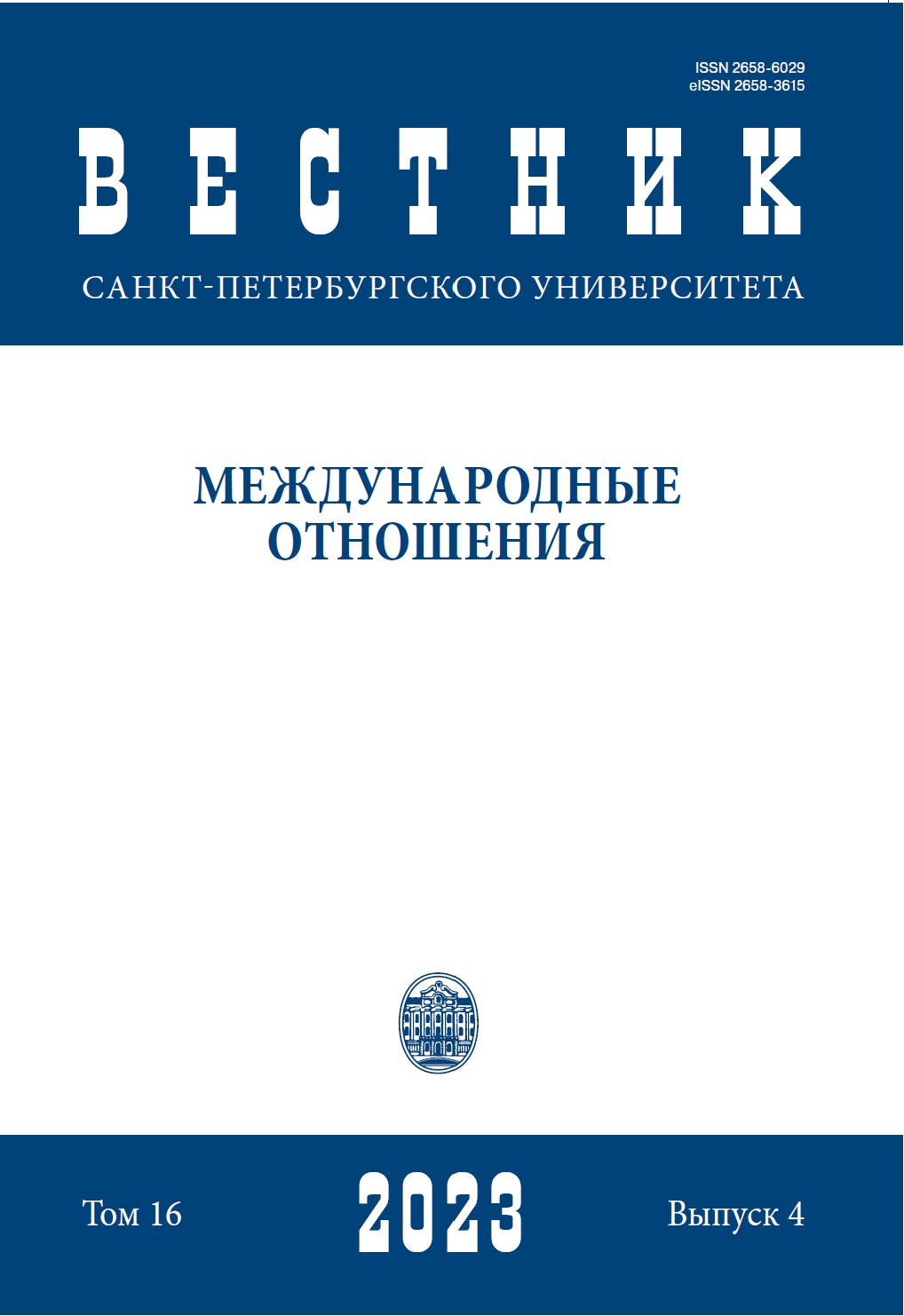The contemporary political elite of Central and South-Eastern European countries: Personalities and general trends (reflecting on a recent book)
DOI:
https://doi.org/10.21638/spbu06.2023.402Abstract
The purpose of the article is to study the state of the modern political elite in the countries of Central and South-Eastern Europe, to identify the main trends in its development and the role of personal factors based on the analysis carried out by the authors of the collective monograph of the Institute of Slavic Studies of the Russian Academy of Sciences. Generally, the transition in Central European countries from socialism to capitalism successfully took place, and the line of integration into the Western world prevailed. However, among the countries’ ruling circles, there are both supporters of total acceptance of the rules established in Brussels and those who seek to preserve greater independence for their countries within European and Euro-Atlantic structures. These contradictions are serious but surmountable due to the already established political institutions in these countries and some experience of political compromises. In South-Eastern Europe, the transition to capitalism was more complex, accompanied by acute national conflicts. It is currently complicated by a de facto suspension of these countries’ accession to the EU. The result is a more diverse composition of the elite in this region compared to Central Europe — former communists, military men, and nationalists are significantly more numerous here. The situation is aggravated by the weakness of political institutions and the elites’ inability, and sometimes unwillingness, to seek solutions to problems through compromises. Particularly noteworthy are the biographies of R. Erdogan and A. Tsipras, who tried (the first successfully, the second not) to implement radical changes in the political life of their countries. Politicians from all considered countries focusing on national characteristics and traditional values generally have significant potential. It would be advisable for Russia to analyze the successes and failures in relations with the Central and South-Eastern European countries in recent decades and learn from this experience for future policy.
Keywords:
political elite, Central Europe, South-Eastern Europe, Russian foreign policy, European Union, NATO
Downloads
References
Speech by Olaf Scholz, Chancellor of the Federal Republic of Germany and Member of the German Bundestag, at the Charles University in Prague: “Europe is our future”, 29 August 2022. URL: https://www.bundesregierung.de/breg-de/suche/rede-von-bundeskanzler-scholz-an-der-karls-universitaet-am-29-august-2022-in-prag-2079534 (дата обращения: 29.06.2023).
Новая элита в странах Центральной и Юго-Восточной Европы: политические портреты. Конец XX — начало XXI в. (2022), отв. ред. Никифоров, К. В., М.: Институт славяноведения РАН; СПб.: Нестор-История.
Пленники национальной идеи. Политические портреты лидеров Восточной Европы (первая треть XX в.) (1993), М.: Институт славяноведения и балканистики РАН.
До и после Версаля. Политические лидеры и идея национального государства в Центральной и Юго-Восточной Европе (2009), М.: Индрик, 2009.
Канарская, А. Н. (2022), «Герои» и «антигерои» в истории Центральной и Юго-Восточной Европы (вторая половина ХХ века). Обзор конференции в Институте славяноведения РАН, Славяноведение, № 1, с. 113–122.
Советский фактор в Восточной Европе. 1944–1953 гг. Документы (1999), в 2 т., т. 1: 1944– 1948 гг., Рос. академия наук, Ин-т славяноведения, Федер. архив. служба России, Гос. архив Российской Федерации, Рос. гос. архив соц.-полит. истории, отв. редактор Волокитина, Т. В. М.: Российская политическая энциклопедия (РОССПЭН), с. 315–316.
Восточная Европа в документах российских архивов. 1944–1953 гг. (1997), т. 1: 1944–1948 гг., Ин-т славяноведения и балканистики РАН, Рос. центр хранения и изучения док. по новейшей истории, Гос. архив РФ, М.; Новосибирск: Сибирский хронограф.
Enver Hoxha, Selected Works. Volume II. November 1948 — November 1965 (1975), Tirana: The “8 Nentori” Publishing House.
European Diplomatic Academy: Opening remarks by High Representative Josep Borrell at the inauguration of the pilot programme. 13 October 2022. URL: https://www.eeas.europa.eu/eeas/europeandiplomatic-academy-opening-remarks-high-representative-josep-borrell-inauguration_en (дата обращения: 29.06.2023).
References
Speech by Olaf Scholz, Chancellor of the Federal Republic of Germany and Member of the German Bundestag, at the Charles University in Prague: “Europe is our future”, 9 August 2022. Available at: https://www.bundesregierung.de/breg-de/suche/rede-von-bundeskanzler-scholz-an-der-karls-universitaet-am-29-august-2022-in-prag-2079534 (accessed: 29.06.2023).
The new elite in the countries of Central and South-Eastern Europe: Political portraits. Late XX — early XXI century (2022), ed. by Nikiforov, K. V., Мoscow: Institute of Slavic Studies RAS Publ.; St. Petersburg: Nestor-Istoriia Publ. (In Russian)
Prisoners of the national idea. Political portraits of the leaders of Eastern Europe (the first third of the XX century) (1993), Мoscow: Institute of Slavic and Balkan Studies RAS Publ. (In Russian)
Before and after Versailles. Political leaders and the idea of a nation-State in Central and South-Eastern Europe (2009), Мoscow: Indrik Publ. (In Russian)
Kanarskaya, A. N. (2022), “Heroes” and “antiheroes” in the history of Central and Southeastern Europe (the second half of the twentieth century). Review of the conference at the Institute of Slavic Studies of the Russian Academy of Sciences, Slavianovedenie, no. 1, pp. 113–122. (In Russian)
The Soviet factor in Eastern Europe. 1944–1953. Documents (1999), in 2 vols, vol. 1: 1944–1948, ed. by Volokitina, T. V., Мoscow: Rossiiskaia politicheskaia entsiklopediia (ROSSPEN) Publ., pp. 315–316. (In Russian)
Eastern Europe in the documents of the Russian archives. 1944–1953 (1997), vol. I: 1944–1948, Мoscow, Novosibirsk: Sibirskii khronograf Publ. (In Russian)
Hoxha E. (1975), Selected Works, vol. 2: November 1948 — November 1965, Tirana: The “8 Nentori” Publishing House.
European Diplomatic Academy: Opening remarks by High Representative Josep Borrell at the inauguration of the pilot programme, 13 October 2022. Available at: https://www.eeas.europa.eu/eeas/european-diplomatic-academy-opening-remarks-high-representative-josep-borrell-inauguration_en (accessed: 29.06.2023).
Downloads
Published
How to Cite
Issue
Section
License
Articles of "Vestnik of Saint Petersburg University. International relations" are open access distributed under the terms of the License Agreement with Saint Petersburg State University, which permits to the authors unrestricted distribution and self-archiving free of charge.




